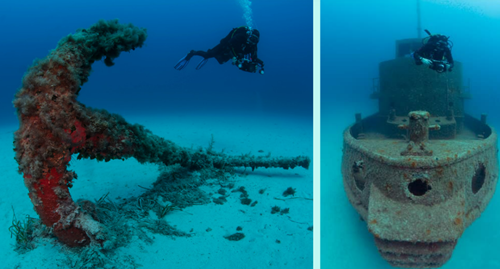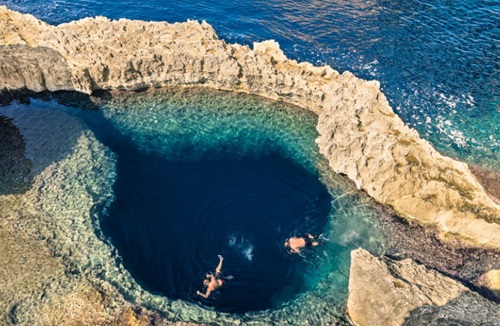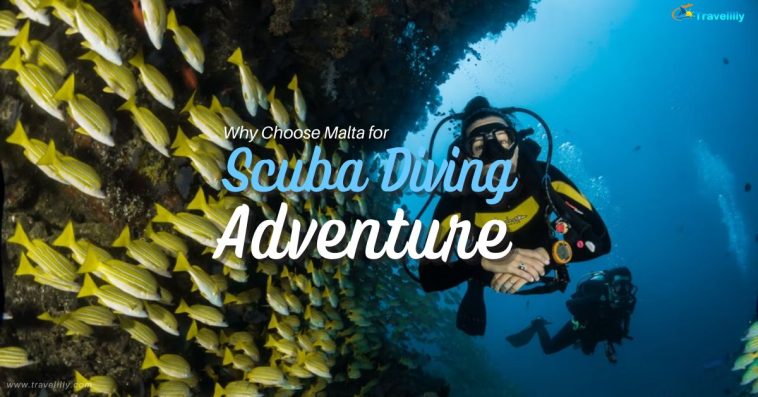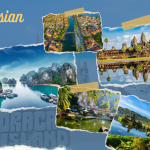Scuba diving is an exhilarating experience, offering a unique opportunity to explore the breathtaking underwater world. Whether you’re planning a dive trip to the azure waters of Malta or any other diving destination, it’s essential to prepare properly. While the thrill of discovering vibrant marine life is appealing, there are a few crucial things you must know before you take the plunge. Diving safely and responsibly requires proper training, physical preparation, and awareness of your body’s needs, ensuring you have an enjoyable and safe experience.
In this article, we’ll explore the essential things you need to know before scuba diving, particularly when planning a diving adventure in Malta. From choosing a diving school to understanding physical fitness and dietary habits, we’ll cover everything that will help you make the most out of your diving expedition.
Why Choose Malta for Your Scuba Diving Adventure?
Malta, an archipelago in the heart of the Mediterranean Sea, is a premier destination for scuba diving enthusiasts, attracting divers from all over the world. Its crystal-clear waters, rich marine biodiversity, and fascinating underwater landscapes make it an ideal location for both novice and experienced divers. Whether you’re looking to explore colorful reefs, shipwrecks, or underwater caves, Malta has it all. Here’s why you should consider Malta for your next scuba diving adventure:
1. Perfect Diving Conditions Year-Round
One of the biggest draws of Malta for scuba diving is its ideal diving conditions that are available throughout the year. The island enjoys a Mediterranean climate, which means warm temperatures, calm seas, and excellent visibility, even in the winter months. During the summer, the water temperature ranges from 22°C to 30°C (72°F to 86°F), making it comfortable for long dives. In the cooler months (November to April), the water still remains relatively warm, averaging around 16°C to 18°C (61°F to 64°F), so you can dive year-round. Moreover, the excellent visibility of up to 30 meters (100 feet) in some areas makes Malta an underwater photographer’s paradise.
2. Diverse Marine Life
Malta’s waters are teeming with a variety of marine life, making it a fantastic destination for divers keen on experiencing underwater biodiversity. Whether you’re exploring shallow reefs or deep wrecks, you’re likely to encounter a range of marine species, from colorful fish like parrotfish, wrasse, and groupers to larger creatures such as tuna and even octopuses. The waters are also home to various types of rays, seahorses, and the occasional dolphin or loggerhead sea turtle, which can make your dive truly magical.
3. Famous Shipwrecks and Historical Sites
Malta’s rich history extends beyond its surface, with the Mediterranean Sea surrounding it serving as a graveyard for numerous ships over the centuries. Malta is known for its impressive collection of shipwrecks, many of which are accessible to recreational divers. These wrecks are not only visually intriguing but also offer an insight into Malta’s maritime history. For instance, the Imperial Eagle, a 19th-century wreck, and the HMS Maori, a World War II shipwreck, are two of the most popular dive sites. Exploring these wrecks, which have become artificial reefs, offers a unique opportunity to dive through history while observing marine life flourishing around them.

4. Variety of Dive Sites for All Levels
Whether you’re a beginner or an experienced diver, Malta offers a wide range of dive sites suitable for every skill level. For beginners, there are plenty of shallow reefs and protected bays, like those in the southern part of the island, where you can gradually build your diving confidence and skills. As you progress, you can explore deeper sites, caves, and wrecks, such as the famous Blue Hole and Cirkewwa. These dive sites provide a diverse underwater environment to explore, ranging from underwater tunnels and caverns to dramatic drop-offs and rocky formations. Malta’s dive schools are well-equipped to guide you at any skill level, ensuring that you can explore the underwater world in the safest way possible.
5. Crystal-Clear Water and Excellent Visibility
One of the defining features of diving in Malta is the stunning clarity of its water. With visibility often reaching 30 meters (100 feet) or more, divers are able to fully appreciate the beauty of the marine environment. The water clarity is a result of the Mediterranean’s relatively low nutrient levels, which prevent the growth of algae and provide a pristine view of the underwater world. This is especially advantageous for divers who enjoy underwater photography, as the vibrant colors and intricate details of the marine life are enhanced in such clear conditions.
6. Easy Access and Safety
Malta is easily accessible from major European cities, with regular flights from hubs like London, Rome, and Frankfurt. The island’s compact size also makes it easy to explore by car or public transport, allowing divers to easily reach dive sites from most parts of the island. The dive centers in Malta are highly professional, with well-maintained equipment and experienced instructors who prioritize safety. Malta has a solid reputation for its diving infrastructure, and its dive centers are often certified by international organizations like PADI, SSI, or CMAS, ensuring that you receive top-notch training and guidance.
7. Unique Underwater Topography
The diverse underwater landscape of Malta is another compelling reason to choose it for your scuba diving adventure. The island’s topography includes impressive underwater caves, tunnels, and caverns that offer exciting and challenging dives for experienced divers. One of the most famous dive sites is the Blue Hole on Gozo, which is a natural rock formation with crystal-clear water that creates a stunning diving experience. The Azure Window, although it collapsed in 2017, was another unique spot where divers could explore a sea arch and its surroundings. The intricate underwater formations make Malta a great place for divers looking for more than just coral reefs.

8. Convenient Facilities and Support Services
Malta boasts a wide range of services that cater to divers, including rental shops for diving gear, boat dives, guided tours, and even diving excursions to nearby islands like Gozo and Comino. Many diving centers also offer PADI certification courses, so if you’re new to diving, you can easily obtain a diving license in Malta. Additionally, some dive centers offer a combination of diving and other recreational activities, such as kayaking or hiking, providing a well-rounded vacation experience.
9. Commitment to Conservation
As diving tourism grows, so does Malta’s commitment to preserving its marine ecosystems. Many dive centers work closely with local authorities and conservation groups to maintain sustainable practices and protect the underwater environment. Malta has numerous marine protected areas, such as the Gozo Marine Park, where divers can explore pristine areas while adhering to conservation guidelines. This focus on sustainability ensures that Malta remains a thriving destination for scuba diving for generations to come.
10. A Rich Cultural Experience Beyond Diving
While diving in Malta is a fantastic experience, the island itself offers much more to explore. After your dives, take time to explore the historical sites, charming villages, and beautiful beaches that Malta is known for. Visit the ancient city of Mdina, the capital Valletta, or the picturesque fishing villages on Gozo. The rich cultural heritage of the island, combined with its Mediterranean cuisine and vibrant nightlife, creates the perfect balance for any diver looking for both adventure and relaxation.
Selecting the Right Diving Institute
When you set out for your scuba diving adventure in Malta, hiring a reputable diving school is essential. There are many institutes around the island that provide extensive diving courses, ranging from beginner programs to advanced certifications. These institutes not only offer high-quality instruction but also ensure that you have access to the necessary equipment and a safe environment for your dives.
If you are a first-time diver, you can easily start with a beginner’s course. This will teach you the basic skills required for scuba diving, including how to use the equipment, basic underwater navigation, and underwater communication techniques. Instructors will also explain the importance of maintaining buoyancy and the various safety measures that must be followed underwater. Most diving schools in Malta offer both short introductory courses and more comprehensive programs for certification, such as the PADI Open Water Diver course.
Importance of Physical Fitness
While you don’t need to be a professional athlete or have a toned, six-pack body to enjoy scuba diving, being physically fit plays an important role in your overall experience. Scuba diving requires you to be in a relatively good physical condition, as it involves carrying heavy equipment, including the oxygen tank and other gear, as well as enduring some physical exertion during the dive itself. The better your fitness level, the easier it will be to move around and breathe underwater.
Many people underestimate the physical demands of scuba diving, but if you’re overweight or unfit, it can negatively impact your experience. Carrying extra weight makes it harder to manage your buoyancy and could lead to fatigue, making the dive less enjoyable. You may also struggle to catch your breath even with the oxygen tank, which can cause discomfort.
How to Improve Your Fitness for Scuba Diving
To ensure you’re in good shape before your dive, consider starting a fitness routine at least one month before your trip. Focus on exercises that will improve your cardiovascular health, endurance, and overall stamina. Walking, running, swimming, and cycling are excellent options that improve cardiovascular fitness, which is essential for maintaining energy and breathing efficiently during the dive. Swimming, in particular, is great because it mimics the movement required when you’re in the water, and it also strengthens muscles you’ll use for diving.
In addition to aerobic exercises, you can also try yoga or meditation to enhance your breathing techniques. These practices will help you become more mindful of your breath, which can be especially beneficial for controlling your oxygen consumption while diving. Focused breathing exercises, such as deep diaphragmatic breathing, can help you stay calm and conserve energy while underwater.
What to Eat Before and After Scuba Diving
Your eating habits before and after a dive are just as important as your physical preparation. Proper nutrition will help keep your body in optimal condition for diving. Here are some key points to consider regarding your diet:
1. Before the Dive:
Research has shown that eating a large or heavy meal before a dive can make you feel nauseous or uncomfortable underwater. Eating too much can lead to bloating or indigestion, which can disrupt your diving experience. It’s recommended to eat a light meal, preferably one that is easily digestible. Opt for a small serving of fresh fruit, such as bananas or apples, or a glass of fruit juice. These will provide quick energy without making you feel sluggish or uncomfortable.
It’s also a good idea to stay hydrated before your dive, as dehydration can cause fatigue and impair your physical performance. However, avoid excessive caffeine or sugary drinks, as they can lead to dehydration.
2. After the Dive:
Once you return to the surface, you’ll need to replenish your energy stores. The physical activity of diving, coupled with the mental focus required, can leave you feeling drained. After the dive, it’s best to have a more substantial meal to refuel your body. A balanced meal rich in proteins, carbohydrates, and healthy fats will help your muscles recover and restore your energy levels. Foods like grilled chicken, fish, whole grains, vegetables, and fruits are excellent choices.
If you’re serious about preparing for your dive, consider asking your diving instructor to provide a personalized diet chart that will guide your nutrition in the weeks leading up to your dive. They may also suggest particular foods to avoid, such as alcohol, which can impair your judgment and physical ability. Additionally, consuming too much salt or processed foods might hinder your body’s ability to recover after a dive.
Diving Safety and Communication
When you are out on a dive, your safety is of utmost importance. Diving schools teach essential underwater communication using hand signals, which are crucial for conveying messages to your dive buddy or instructor. Knowing these basic signals will allow you to convey critical information such as “OK”, “problem”, or “I need air” during the dive. Diving instructors will ensure you understand how to communicate effectively, which helps in maintaining a smooth and safe experience underwater.
Additionally, it’s essential to dive within your skill level. If you’re a beginner, avoid going too deep or engaging in advanced dives until you have gained enough experience. Always dive with a buddy or instructor, as diving alone can be dangerous. Proper safety measures, such as monitoring your air supply, checking your equipment before the dive, and adhering to no-decompression limits, are all part of responsible diving practices.
Malta is the perfect destination for Scuba diving adventure
Scuba diving is an amazing way to discover the underwater world, and Malta offers some of the most incredible dive sites for both beginners and seasoned divers. However, to ensure you have a safe, enjoyable, and memorable experience, it’s essential to be well-prepared. By selecting a good diving school, maintaining your physical fitness, and focusing on proper nutrition, you can make the most out of your diving adventure.
Preparing physically and mentally for a dive will help you enjoy the thrill of the dive without unnecessary discomfort or fatigue. So, take the time to train your body, learn the essential skills, and follow the advice on eating and hydration. The underwater world of Malta is waiting for you, and with the right preparation, you’ll be ready to dive in and explore the stunning marine life it has to offer.
By planning ahead and taking care of your health and fitness, you can ensure that your diving experience will be both safe and unforgettable. Whether you’re diving for the first time or returning for another adventure, proper preparation is the key to making your dive a success!



